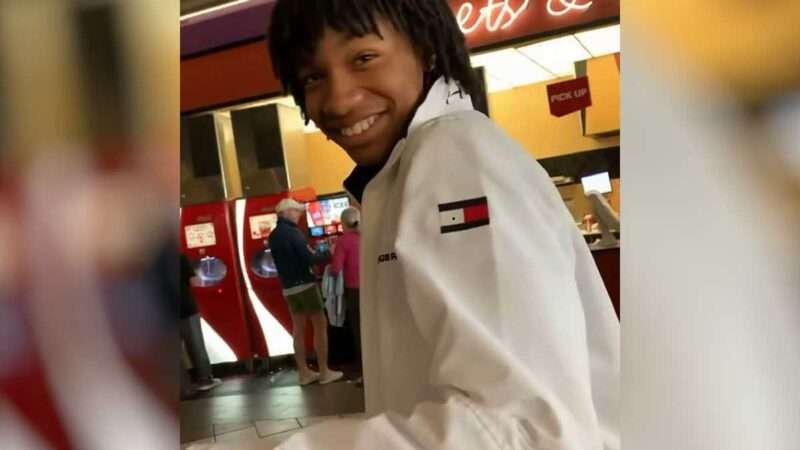Alabama Teen Killed During ‘No-Knock’ Drug Raid Had His Hands Raised, Lawsuit Says

A 16-year-old teenager had his hands raised when he was fatally shot by police during an unauthorized “no-knock” drug raid in Mobile, Alabama, last year, according to a civil rights lawsuit filed by his mother in federal court earlier this month.
The lawsuit against the City of Mobile and several anonymous Mobile police officers says Randall Adjessom came out of his room holding a gun when he heard someone break down the front door of the house where he lived with his mother, grandmother, aunt, and sisters. When he realized the intruders were police, he put his hands in the air and stepped back, but a Mobile Police Department (MPD) SWAT officer shot him four times.
“The complaint is replete with revelations from our pre-suit investigation,” civil rights attorneys representing Adjessom’s mother said in a press release accompanying the suit, “perhaps none more repulsive than the fact that MPD body-worn camera (BWC) video of the shooting clearly shows Randall begin to retreat after realizing the intruders into his family home were members of the police force when he was repeatedly shot and killed in cold blood.”
And after he was shot, the suit says, police left Adjessom to bleed out on the floor for four minutes before half-heartedly rendering medical aid.
If true, the lawsuit’s narrative—which purports to be backed by video evidence, internal affairs reviews, and a recent independent audit of the Mobile Police Department—is another tragic example of what happens when the drug war, unregulated SWAT teams, and the Second Amendment right to self-defense mix.
An MPD SWAT team executed a “no-knock” search warrant on November 18, 2023, as part of an investigation into Adjessom’s older adult brother for suspected marijuana sales. However, the lawsuit says Adjessom’s brother did not live at the residence the MPD acquired a search warrant for—only Adjessom, who was a minor, and several women in his family.
The lawsuit says there were numerous problems with the raid besides the absence of its only articulated target: MPD officers intentionally didn’t evaluate the risk to civilians in its pre-warrant threat assessment or note the presence of civilians in its search warrant affidavit; didn’t obtain authorization for a nighttime raid from a judge, supervisor, or prosecutor; and failed to announce themselves until after they had breached the front door and entered the house.
All those errors became a force that swept together—like a malevolent current—the MPD SWAT officers and Randall Adjessom, who came out of his bedroom and turned into the hallway holding a gun with a laser sight.
The lawsuit says that when Adjessom realized the intruders were police, “Randall immediately began to raise his hands (including the firearm in his hand) and step back away from the officers.”
“His retreat caused the laser sight on the firearm to move from pointing in front of him at the police officers to the wall,” the lawsuit’s narrative continues. “Randall never attempted to fire the weapon at anyone. BWC footage shows the Police Officer Defendants’ vantage point. From this footage, it is clear that Police Officer Defendants would have seen Randall putting his hands up and taking a step backwards in retreat.”
Despite this, an unknown Mobile police officer shot Adjessom four times. In total, 11 seconds passed between SWAT officers breaching the door and the shooting.
According to the lawsuit, after he was shot, Adjessom “was writhing on the floor in pain, actively bleeding to death.” However, MPD officers “can be seen on a BWC stepping over his body instead of bending down to comfort or care for him.”
“What are we going to do with this?” one officer asks on the body camera footage after Adjessom is shot.
Four minutes would pass before a SWAT officer began applying bandages to Adjessom’s several gunshot wounds.
The lawsuit says medical records show Adjessom was not admitted to a hospital and declared dead until 50 minutes after he was shot. The nearest hospital is eight minutes from the family’s house.
The lawsuit is the latest problem for the MPD. An independent investigation into the department launched by Mobile officials last year and conducted by a former federal prosecutor found a litany of constitutional violations, excessive force, and unnecessary deaths, particularly targeting Mobile’s black community.
The report singled out former Mobile Police Chief Paul Prine for his “autocratic tendencies” and included an unidentified MPD police officer who recalled Prine telling MPD officers, “I’m not concerned with what the media and public thinks about the police. Fuck the public.”
The City of Mobile fired Prine in April after he refused an offer to retire with a full pension. On Thursday Prine sued numerous Mobile city officials and Kenyen Brown, the author of the report, for “willful, false, malicious, defamatory and slanderous statements.”
But the raid that resulted in Adjessom’s death is not an isolated incident or the result of an unusually unprofessional police department. In Illinois, cops have terrorized children’s birthday parties, humiliated innocent women, and shot a 12-year-old in the kneecap because of sloppy and unnecessary SWAT raids. In Detroit, the city has paid hundreds of thousands of dollars to settle lawsuits because police can’t stop shooting dogs during drug raids.
SWAT raids can turn into mortal dangers for civilians and police alike when they mix with America’s robust right to self-defense. In 2022, Florida resident Corey Marioneaux Jr. was charged with attempted murder of a police officer for shooting a gun at SWAT team officers who had just broken through his front door with a battering ram at 5 a.m. The charges against Marioneaux were later dropped, and an internal review found no wrongdoing on the part of the police.
That same year a Minneapolis Police Department officer shot and killed 22-year-old Amir Locke during the execution of a no-knock raid. Locke, who was not named in the search warrant, appeared to be asleep under a blanket on a couch. As police entered the room, he put his hand on a handgun, and an officer shot him three times.
The law guarantees citizens the right to defend their homes with guns, but it also allows police to break down doors in the middle of the night and shoot any confused, half-asleep person who exercises that right. This incoherence is one of the most important reasons why SWAT teams should be reserved for truly dangerous situations, not pot raids on family homes.
The Adjessom’s lawsuit against the City of Mobile and several anonymous Mobile police officers seeks damages for violations of the Adjessom family’s Fourth and 14th Amendment rights, as well as for claims under Alabama’s wrongful death statute.
The City of Mobile did not immediately respond to a request for comment.
The post Alabama Teen Killed During ‘No-Knock’ Drug Raid Had His Hands Raised, Lawsuit Says appeared first on Reason.com.
